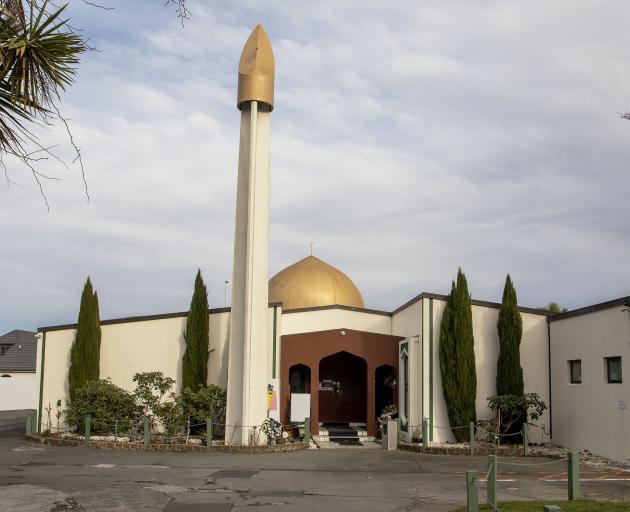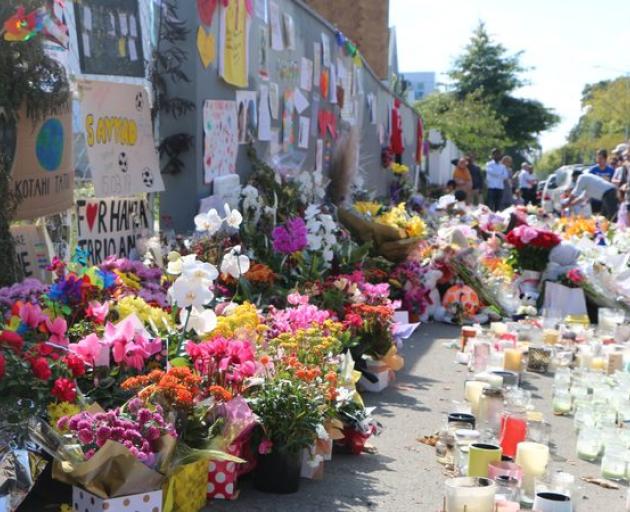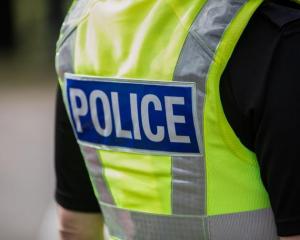WARNING: contains distressing content
After gunning down nearly 100 people, the terrorist who targeted two Christchurch mosques chillingly told police he wish he had shot more.
- Mosque killings: Sentencing process explained
- We are not broken': Victims face mosque shooter in court
Brenton Tarrant (29) is being sentenced in the High Court at Christchurch today after admitting 51 counts of murder, 40 of attempted murder and one charge under the Terrorism Suppression Act.
The shootings took place on March 15 last year during Friday prayers.
Hundreds packed the courtroom and seven overflow rooms, with hundreds more watching on live-streams in 15 nations.
Tarrant was escorted by into court wearing grey prison garb, heavily shackled and simply nodded when asked whether he was representing himself. The hearing is expected to take at least three days.

It revealed how the gunman told police that four modified petrol containers found in his car were designed to burn down Al Noor Mosque and the Linwood Islamic Centre in Christchurch and one in Ashburton which he planned to visit while heading south back to Dunedin where he lived.
Tarrant's comments to police following his arrest after the rampage on March 15 last year had never before been released.
He referred to his actions being “terror attacks”, the court heard, and described his victims as “invaders”.
“He also admitted that he had taken planning steps towards attacking other mosques in New Zealand before deciding on Christchurch,” the summary said.

Between December 2017 and March 2019, Tarrant began assembling an arsenal of high-powered firearms, which he later modified for faster firing, as well as 7000 rounds of ammunition, tactical vests and camouflage clothing.
The court heard he honed his skills with the weapons by attending several rifle clubs.
Tarrant searched the internet for detailed plans of the mosques and researched prayer times and important dates in the Islamic calendar.
After writing his manifesto the gunman began the final stages of his preparation.
On January 8, he travelled from Dunedin to Christchurch where he flew a drone over Al Noor Mosque, paying particular attention to the entry and exits and making detailed notes.
“The planned time for entry was to ensure the maximum number of worshippers would be present,” court documents said.
On the fateful day, Tarrant set off with six firearms and a a bullet-proof vest wrapped around the driver's seat.
He mounted a camera to the front of his helmet to live-stream the carnage and had a speaker attached to the front of his vest playing loud music.
The court heard he also carried a strobe light to “cause confusion among his victims”.
The majority of the summary of facts painted a horrifying picture of Tarrant's actions inside the two mosques.
Several times, the gunman moved in and out of Al Noor Mosque, coolly executing those who were wounded, cowering in corners or caught in the rush to leave the premises.

ACTS OF HEROISM
Among the tragedy there were also acts of selfless heroism, the summary showed.
Naeem Rashid ran at Tarrant while he was firing a semi-automatic AR-15, knocking him to the ground and dislodging a magazine of ammunition.
The defendant, though, was able to recover and shot the man three times.
Mr Rashid died but his bravery, the court heard, allowed several worshippers to escape.
Many, however, were trapped.
Tarrant “systematically” executed those inside, including 3-year-old Mucaad Ibrahim who was clinging to his father's leg.
On the way across town to the Linwood Islamic Centre, he used a pump-action shotgun to shoot at men of African descent while a Caucasian passer by received a gesture and a smile.
“During this journey the defendant was talking and laughing about various aspects of what occurred and what was occurring in a form of commentary.”
Later, the gunman saw a Fijian man driving beside him. He aimed a shotgun at the man's head from 3m away.
Tarrant was captured on his own camera repeatedly pulled the trigger, but it would not fire, and the man was spared.
The methodical killing spree continued at the second premises, taking out men and women at close range.
After emptying his weapon, Tarrant returned to his vehicle, pursued by a “screaming” Abdul Aziz Wahabazadah.
The defendant fired three shots at him, but the man dived for cover.
After the slayings continued inside the centre, the gunman again returned to the car, once again pursued by Mr Wahabazadah, who had grabbed a discarded rifle.
He threw the firearm at Tarrant's windscreen, smashing it, before the man drove off.
Soon after, he was arrested by police.
Justice Cameron Mander opened this morning's hearing by acknowledging the additional stress for those involved caused by Covid-19, which meant some could not attend.
'AN ATTACK ON ALL OF US'
The first of more than 60 victim-impact statements was read by Al Noor Mosque imam Gamal Fouda, who said it was a place of peace and tranquillity before the deadly attack.

“All the time I've lived in New Zealand I've felt safe and enjoyed . . . the opportunity to practice my faith without prejudice,” he said.
He refused to discuss the horrors of what he witnessed that day, instead focusing on the aftermath.
“I found it very difficult as the community expected me... to stand there before them and work through the challenges,” Mr Fouda said.
He also refused to name the gunman, referring to him only as “the terrorist”.
“There's been much change in our community but I love New Zealand and the society showed love and support for us,” said Mr Fouda.
“This response from our community was the opposite of what the terrorist had wanted.”
The Imam took the opportunity to acknowledge Tarrant's family who he said must also be suffering.
Muhubo Ali Jama drove to Al Noor Mosque with her husband Muse Awale to pray that day.
Then the shooting started.
“I saw bodies stacked on top of one another,” she told the court.
She eventually found her husband lying in the car park.
“I sat beside him and held him. I checked his eyes, heart and breathing - there was nothing,” she said.
The manager of Dunedin's An-Nur early childhood centre Maysoon Salama says she cannot forgive her son's killer.
“You gave yourself the authority to take the souls of 51 innocent people. Their only crime in your eyes was they were Muslims,” she said.
“I don't think the world will forgive you for your horrible crime against humanity.”
Ata Elayyan was one of the 44 killed at Al Noor Mosque.
His name meant “gift from Allah” and Dr Salama said he was “the best gift for 33 years, taken from us viciously and cruelly”.
She was haunted by what went through his mind as he faced the gunman and the pain of his loss came in constant waves.
“My heart breaks millions of times... like feeling the pain of labour again and again,” the grieving mother said.
“Ata is gone but never forgotten. He'll always be the light of our lives and we'll live his legacy every day.”
They were sentiments echoed by Mr Elayyan's father Mohammad Alayan who was shot twice in the same attack.

He recalled lying on the floor of the mosque, bleeding profusely, reaching out to another wounded worshipper and praying his son had arrived late.
Dr Alayan described his son as “one of a kind” and called for the restoration of the death penalty to address the massacre.
“It was an attack on all of us,” he told the court. “Terror has no religion.”

'WE ARE NOT BROKEN'
Khaled Alnobani was in the front rows at Friday prayers when the first shots rang out.
He described trying to help people, fleeing the scene and living with the guilt of being outside and safe when the horrors unfolded inside.
Returning to work had been impossible since March 15 as he was still “struggling with everyday life”.
After reading his statement, he looked at Tarrant and sent him a message of resilience and defiance.
“We're not broken. We're united. You made that and thank you for that,” Mr Alnobani said.
The trauma was yet another sad chapter in the life of Taj Kamran, who told the court he had fled Afghanistan with his mother when a bomb killed four of his siblings.
He had been left homeless, living in his car, after the 2011 Christchurch earthquakes and was now in chronic pain after being shot three times in the leg.
But the greatest hardship was the loss of his best friend Matiullah Safi who was shot and killed as they prayed together at Al Noor Mosque.
The pair had known each other 13 years and Mr Kamran described him as “better than a brother to me”.
He now rarely attended the mosque because of the feelings it evoked.
“I don't want to live like this, it's too tiring for me. I'm tired of it all,” he said.












